By James Kinchin-White and Ed Moloney
‘I can be a bad bastard if I feel like it. It’s my job’…….Intelligence Officer code-named ‘Kent’, the Gloucester Regiment, circa April 29, 1973
There is little doubt that most people inclined to be sceptical about the claim that Jean McConville worked as an informer against the IRA, are unconvinced because they have difficulty accepting that the British Army would stoop so low as to put the life of a widow with ten children in mortal danger.
Which raises the question of how low the British Army was actually prepared to stoop in its intelligence war against the Provos, especially in the early years of the Troubles when there was a premium on accurate information about the IRA and its activities.
In other words was the military’s intelligence war in Northern Ireland fought in accordance with a moral code of any sort? Were some potential informers off limits – like Jean McConville – or were there no limits?
Well, to judge from the following document plucked from the shelves of the British government’s own archives at Kew, Surrey, the answer is that more or less any vulnerable target with even a minimal amount of access to the IRA was fair game and that in the process of recruiting them as agents, the military was prepared to stoop pretty darned low.
The document, a so-called ‘loose minute’ distributed to political, military and intelligence heads in Belfast on May 1st, 1973, describes the recruitment of a 17/18 year old boy as an informer by soldiers from the intelligence unit of the Gloucester Regiment, then based in the lower Falls/Divis Flats area of West Belfast.
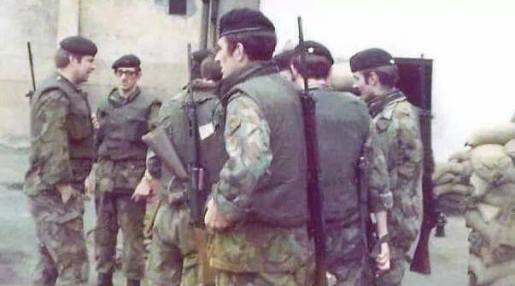
Soldiers from the Gloucestershire Regiment
The recruitment effort backfired badly and the UK media got to know about it, causing consternation in military, political and intelligence circles in Belfast.
The boy, a hotel worker named as William Shields, was arrested in the lower Falls in the early hours of Sunday, April 29th, 1973 and then taken to Hastings Street Army base where he was blackmailed by the Gloucesters into becoming an agent.
The soldiers ‘extracted’ an admission from Shields that he was having sex with the wife of a Provisional IRA internee and that he was ‘living with the woman’. The Gloucester’s Battalion Intelligence Officer then got the boy to sign a letter to the OC of the local IRA admitting all this, and was then pressured to become an informer, on the basis that if he refused, the letter to the IRA would be delivered, with predictable consequences for young Shields.
Afterwards, Shields had the good sense to go to the then West Belfast MP, Gerry Fitt for help. Fitt, according to the British document, witnessed Shields phoning his handler in the Gloucester’s, thereby confirming the boy’s story. The West Belfast MP then got on the phone and informed the handler that he intended to raise the matter in the House of Commons.

Gerry Fitt, then West Belfast MP – listened in to phone call to Gloucester’s Intel Officer and threatened to raise boy’s case in parliament
Gerry Fitt had alerted two Fleet Street reporters, Simon Hoggart of The Guardian and Robert Fisk of The Times who duly wrote up the story. Hoggart was present when Shields and Fitt phoned the Gloucester’s handler and his story, which led the back page of The Guardian on May 2nd, 1973, is reproduced below. Fisk also wrote about the incident but his article could not be located.
After Fitt’s phone conversation, the proverbial hit the fan, leading to the involvement of the then NI Secretary, William Whitelaw who was told by an unnamed official that:
‘…..the press line was that this was a piece of over-enthusiasm at a junior level’.
In other words, nothing to do with the Gloucester’s command. The blame would be carried by junior officers.
Simon Hoggart’s account is worth reading (see below), not least because he was a respected reporter, but also he had details in his account conspicuously absent, or at significant variance from the official report of young Shields’ attempted recruitment circulated, inter alia, to Willie Whitelaw’s office.

The late Simon Hoggart – wrote up the story for The Guardian
According to Hoggart, the boy was only 16, not 17 or 18 as the British document claims and was thus virtually still a child; the boy was also tricked into signing a forged admission of having sex with the IRA internee’s wife (which he denied had happened to Hoggart and Fitt), and the Gloucester’s Intelligence handler, who went by the code name ‘Kent’, threatened to give ‘dozens of copies’ of the boy’s alleged admission to the IRA, effectively delivering a death threat to the youngster.
The handler also told the boy, according to the account given to Hoggart:
‘I can be a bad bastard if I feel like it. It’s my job’.
So this under-age, innocent young lad was tricked, terrified and blackmailed into becoming a British Army agent and despatched down a path which, but for the intervention of Gerry Fitt and a couple of journalists, might very well have ended with his death.
As to what conclusions one can come to about whether Jean McConville’s own very evident vulnerability would have deterred someone like “Kent’ from considering her a candidate for recruitment, the reader can make up his or her own mind.
It is interesting to note that this was the Gloucester’s second recent tour in the lower Falls/Divis Flats area. They had first served a three month tour in that district between December 7th, 1971 and April 13th, 1972, about a year before the incident described above.
The regiment’s War Diary for that tour has been embargoed until 2059. Most other regimental War Diaries during the years of the Troubles have not been embargoed and some can even be purchased on eBay. Why is that?
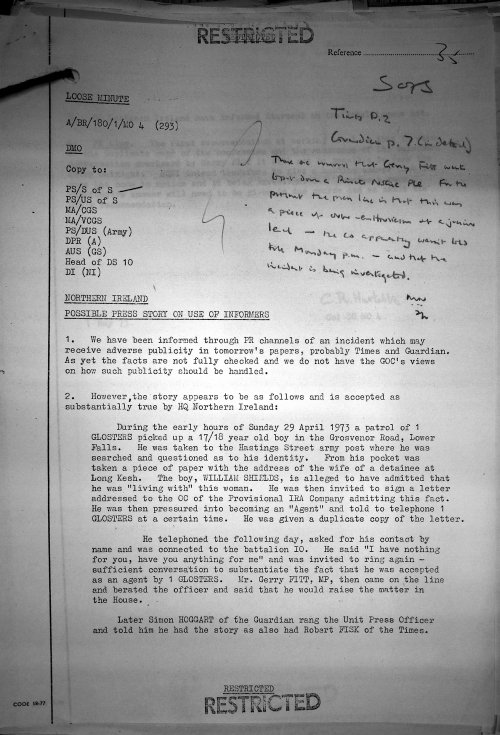
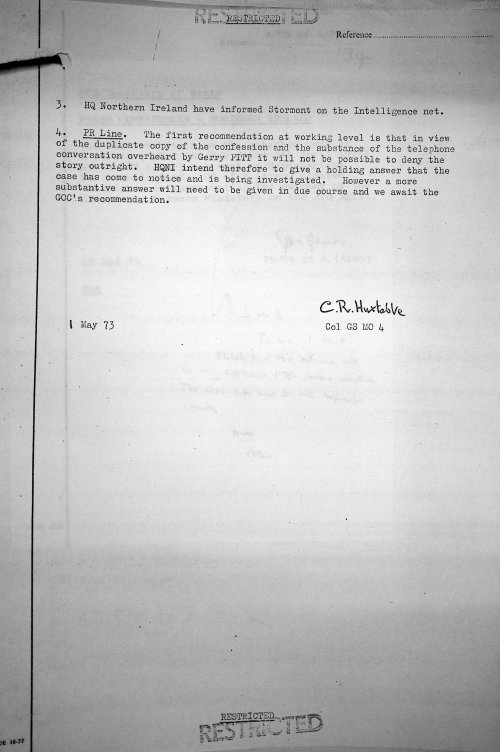
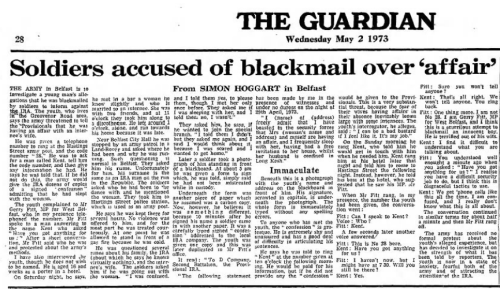
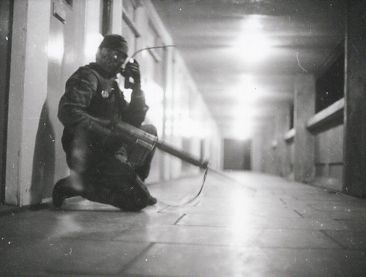
A soldier in the First Gloucesters Regiment uses a Stornophone-type radio in one of the corridors in Divis Flats in April 1972 – the First Gloucester’s War Diary of their tour in Divis from Dec 1971 to April 1972 has been embargoed until 2059


What bothers me about the Jean McConville story (actually there’s a lot that bothers me about that tragic story) in the recent articles you posted regarding the radio is JM lived in a cramped apartment with most of her 10 children.
Her son, Michael, is on record saying he and his siblings would have known if there was a radio in their apartment because they knew every nook & cranny in that small space. They don’t believe she was an informer because they never found a radio in the apartment and she was always busy looking after her large brood of children.
Its very possible the British Army would have stooped that low and had her as an informer. It’s also possible she wasn’t an informer and then said she was when they were torturing her in order to get them to stop hurting her.
I guess I just don’t understand why arrangements couldn’t have been made to move her and her children out of Northern Ireland by way of a Catholic Charity or something instead abducting her & blowing her head off.
1 – Just because they didn’t find it doesn’t mean it wasn’t there. It’s not impossible to hide things from lots of kids in a small area.
2 – Why would she be tortured and then let go the first time? Makes no sense.
3 – Context.
The IRA had toppled Stormont that year, held talks with the British and had seen their numbers double due to incidents like Bloody Sunday. With that in mind, they would have been in no mood for compromising.
If people read Brendan Hughes’ interview in Voices From the Grave, he makes it clear that it was a remark from one of the children about the radio that alerted the IRA to the situation……
Christ, talk about absolute filth!!
the RUC had 70 hand held radios in use among 3000 personnel in 1969,not 1 per person as alluded in your article.
Where is the evidence that Mrs McConville was a british agent PIRA says so, let them produce the evidence, remember they lied about the radio transmitter that was found in her house, it wasn’t in use at the time, i suppose if you throw enough mud at someone, it will stick, but in defence of PIRA, you insult the memory of an innocent woman
Nobody, least of all myself, claimed that every single RUC man carried a radio, just that they had been issued for use. The radio transmitter was in use at the time. All the evidence shows that. You are beginning to sound like a broken record…….
Ed, I hate to debunk your theory but I am fully aware how far and how low British military agencies will go in their use of agents and informers. Aiding and abetting murder was used as and when required. However, I do not believe Jean McConville was an informer. Every piece of evidence to suggest so and be very easily and logically countered. I think we all get the message that the type of radio in question was available during the period in question, but I as I have repeatedly stated local radio transmissions made by the RUC/British Army could be picked up by an FM radio. A broadcast by a civilian women with a Belfast accent, even spoken in code, would have stuck out like a sore thumb, which deems it a pretty useless piece of kit for communication between informant and handler.
Actually, not true. Stornophones were set to specified frequencies not available on FM. The evidence that they were used by the military and police is overwhelming and they would not have used them if they were not secure. As for what took place during conversations, one can only speculate but common sense suggests that in an area where public phones were unsafe or out of order, a radio could be used, utilising pre-arranged codes, to arrange meetings or send other signals. I understand you do not want to believe that J was an informer and that is your prerogative. For my part, I am one of the few to have talked to those intimately involved in her case on the IRA side and that is how I have arrived at my conclusions. You have not debunked my theory, merely challenged it, and very weakly if I must say……
If these radios were indeed set up for specific frequencies used only by the RUC and military then that would military intelligence were using a method of communication that could be easily intercepted and received by other members of the security forces. Hardly proven method use by any British spooks?
Several informers and agents have documented their time with British intelligence (in its various guises) and not one has mentioned being issued with such a device. To be caught with one would be akin to wearing a British Army regimental badge, it would be that obvious and downright dangerous.
Too be honest I wouldn’t believe a word that the IRA said about this case.
Anyway, keep up the good work on the blog.
Firstly, the story DID NOT come from the IRA, it came from former members Brendan Hughes and Dolours Price, speaking as former members.So if you’re happy to not believe a word they say, does that mean you don’t believe Adams was involved at all?
Also, I suspect the reason you’ve never read about other informers using them is because this was in the early days of the conflict. After 1975, the Army knew who was who and wouldn’t have needed people like Jean McConville.